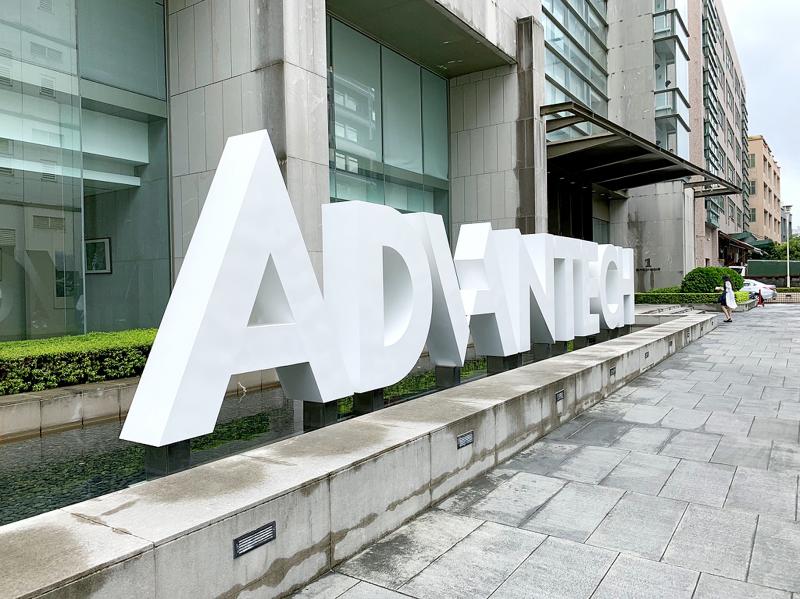Leading industrial PC maker Advantech Co Ltd (研華) yesterday gave an optimistic outlook for shipments this quarter, citing recovering market demand as countries around the world gradually move to ease restrictions to contain the COVID-19 pandemic.
“We are seeing quite a significant rebound [in demand] on a sequential basis this quarter, especially in China,” Advantech spokesperson Jill Su (蘇智蘋) told an investors’ conference, citing healthy orders across the board for its embedded Internet of Things (IoT) business segment.
Demand from North America is expected to improve further this quarter, thanks to various applications within the healthcare and logistics sectors, bolstering shipments for Advantech’s industrial IoT and cloud IoT business segments, Su said.

Photo: CNA
“We are having some delays [in shipments] due to the pandemic ... but it [the pandemic] has boosted demand from industries across the board,” Su said, adding that firms are driven to move workloads online as employees work from home.
However, the company’s operations in Europe, which are centered around its service IoT segment, are likely to suffer setbacks as a majority of countries in the region have yet to lift the heavy restrictions imposed to combat the spread of COVID-19, Su said.
China and the US contributed 29 percent each to Advantech’s total sales last year, while Europe generated another 17 percent, company data showed.
Overall sales this quarter are estimated to be between US$450 million and US$470 million, representing an increase of between 19.6 percent and 24.9 percent compared with sales of NT$11.27 billion (US$376.8 million) last quarter, the company said.
Gross margin is expected to be flat at 39 percent or dip slightly to 37 percent, it said.
Operating margin, on the other hand, is forecast to increase from 14.7 percent last quarter to between 16.5 percent and 18.5 percent this quarter on improved operational efficiency, it added.
“Online sales contributed to 10 percent of total sales last quarter as some of our regional offices remained closed,” Su said, pointing to the US, Europe, Japan and India.
The company’s production has, for the most part, resumed to normal levels, Su said, adding that supply shortages of casings, power supplies, cables and connectors are expected to be resolved by the end of the month.
Advantech posted a 24 percent quarter-on-quarter decline and 20 percent year-on-year fall in net profit to NT$1.29 billion for last quarter, leading to earnings per share of NT$1.85, down from NT$2.43 in the previous quarter and NT$2.31 a year earlier.

TRADE WAR: Tariffs should also apply to any goods that pass through the new Beijing-funded port in Chancay, Peru, an adviser to US president-elect Donald Trump said A veteran adviser to US president-elect Donald Trump is proposing that the 60 percent tariffs that Trump vowed to impose on Chinese goods also apply to goods from any country that pass through a new port that Beijing has built in Peru. The duties should apply to goods from China or countries in South America that pass through the new deep-water port Chancay, a town 60km north of Lima, said Mauricio Claver-Carone, an adviser to the Trump transition team who served as senior director for the western hemisphere on the White House National Security Council in his first administration. “Any product going

High above the sparkling surface of the Athens coastline, the cranes for building the 50-floor luxury tower centerpiece of Greece’s future “smart city” look out over the Saronic Gulf. At their feet, construction machinery stirs up dust. Its backers say the 8 billion euro (US$8.43 billion) project financed by private funds is a symbol of Greece’s renaissance after the years of financial stagnation that saw investors flee the country. However, critics see it more as a future “ghetto for the rich.” It is hard to imagine that 10km from the Acropolis, a new city “three times the size of Monaco”

STRUGGLING BUSINESS: South Korea’s biggest company and semiconductor manufacturer’s buyback fuels concerns that it could be missing out on the AI boom Samsung Electronics Co plans to buy back about 10 trillion won (US$7.2 billion) of its own stock over the next year, putting in motion one of the larger shareholder return programs in its history. South Korea’s biggest company would repurchase the stock in stages over the coming 12 months, it said in a regulatory filing on Friday. As a first step, it would buy back about 3 trillion won of paper starting today up until February next year, all of which it would cancel. The board would deliberate on how best to effect the remaining 7 trillion won of buybacks. The move

In a red box factory that stands out among the drab hills of the West Bank, Chat Cola’s employees race to quench Palestinians’ thirst for local products since the Gaza war erupted last year. With packaging reminiscent of Coca-Cola’s iconic red and white aluminum cans, Chat Cola has tapped into Palestinians’ desire to shun brands perceived as too supportive of Israel. “The demand for [Chat Cola] increased since the war began because of the boycott,” owner Fahed Arar said at the factory in the occupied West Bank town of Salfit. Julien, a restaurateur in the city of Ramallah further south,